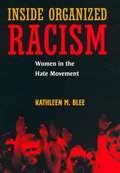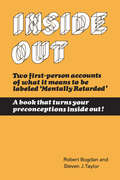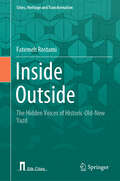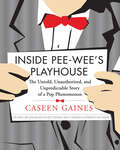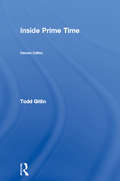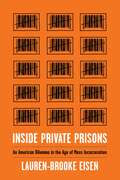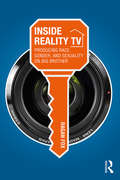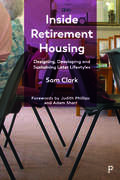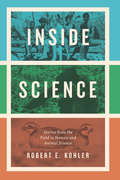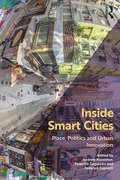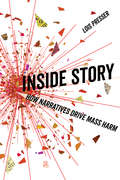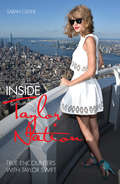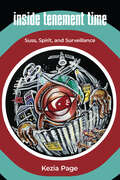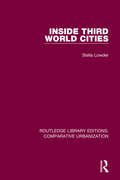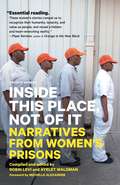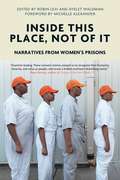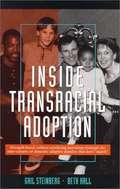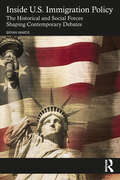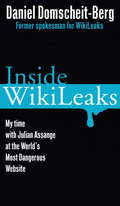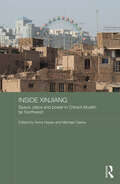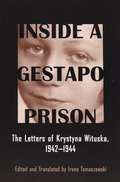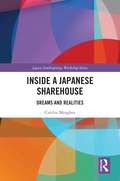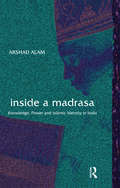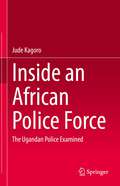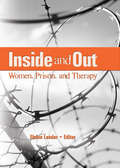- Table View
- List View
Inside Organized Racism: Women in the Hate Movement
by Kathleen M. BleeKathleen M. Blee's disturbing and provocative look at the hidden world of organized racism focuses on women, the newest recruiting targets of racist groups and crucial to their campaign for racial supremacy. Through personal interviews with women active in the Ku Klux Klan, neo-Nazi groups, Christian Identity sects, and white power skinhead gangs across the United States, Blee dispels many misconceptions of organized racism. Women are seldom pushed into the racist movement by any compelling interest, belief, or need, she finds. Most are educated. Only the rare woman grew up poor. Most were not raised in abusive families. Most women did not follow men into the world of organized racism. "Inside Organized Racism" offers a fascinating examination of the submerged social relations and the variety of racist identities that lie behind the apparent homogeneity of the movement. Following up her highly praised study of the women in the 1920s Ku Klux Klan, Blee discovers that many of today's racist women combine dangerous racist and anti-Semitic agendas with otherwise mainstream lives. Few of the women she interviews had strong racist or anti-Semitic views before becoming associated with racist groups. Rather, they learned a virulent hatred of racial minorities and anti-Semitic conspiratorial beliefs by being in racist groups. The only national sample of a broad spectrum of racist activists and the only major work on women racists, this well written and important book also sheds light on how gender relationships shape participation in the movement as a whole.
Inside Out: The Social Meaning of Mental Retardation
by Steven J. Taylor Robert Bogdan Seymour B. Sarason'We have to assume that the mind is working no matter what it looks like on the outside. We can't just judge by appearance...If you take away the label they are human beings.' Ed MurphyWhat does it mean to be 'mentally retarded'? Professors Bogdan and Taylor have interviewed two experts, 'Ed Murphy' and 'Pattie Burt,' for answers. Ed and Pattie, former inmates of institutions for the retarded, tell us in their own words.Their autobiographies are not always pleasant reading. They describe the physical, mental, and emotional abuses heaped upon them throughout their youth and young adulthood; being spurned, neglected, and ultimately abandoned by family and friends; being labelled and stigmatized by social service professionals armed with tests and preconceptions; being incarcerated and depersonalized by the state.Ed and Pattie survived these experiences--evidence, perhaps, of the indefatigable will of the human spirit to assert its essential humanity--but the wounds they have suffered, and the scars they bear, have not been overcome. They are now contributing, independent, members of society, but the stigma of 'mental retardation' remains.Their stories are both true and representative--powerful indictments of our knowledge of, our thinking about, and our ministrations to, the mentally handicapped. The interviewers argue that Ed and Pattie challenge the very concept of 'mental retardation.' Retardation, they assert, is an 'imaginary disease'; our attempts to 'cure' it are a hoax.Read Ed's and Pattie's accounts and judge for yourself.
Inside Outside: The Hidden Voices of Historic-Old-New Yazd (Cities, Heritage and Transformation)
by Fatemeh RostamiThis book is the voice of everyday people talking about their city’s poetry–prose transformation. Through the narrative-imagination of the local lives, the book takes the reader on a journey of the past–present–future of Yazd: how the city was formed and transferred from the historic core to the newer parts over time; how people daily engage with the city; why some people enjoy living in the Historic Yazd while others prefer dwelling in the Old and New cities; why these areas are still occupied with the locals keeping the whole city alive and dynamic; if there is a socio-cultural interrelationship between these areas; and hearing the locals’ wishes about the future of their city. Using the "shoe" as a symbol of various social fabrics of Yazd, the book reveals unseen important matters affecting city life from the moment residents put on their shoes to engage within the city and their public lives to the time they remove their shoes on entering their households to share in their private lives. Beyond hearing the locals' voices, the book also examines to what extent scholars’ definitions of place are in parallel or in contrast with the ordinary people’s definitions of their living places. The book aims to introduce a new urban methodology to urban studies so that local voices can truly be considered in urban planning and design projects. This approach is particularly absent in Iranian urban studies on which this book attempts to investigate, which was examined in Yazd.
Inside Pee-wee's Playhouse: The Untold, Unauthorized, and Unpredictable Story of a Pop Phenomenon
by Caseen Gaines&“Gaines thoroughly explores the innerworkings of the most grownup kiddie show in TV history. Pull up a Chairry and enjoy&” (Michael Musto, Village Voice). Between 1986 and 1991, a pandemic swept the nation. Symptoms included talking to furniture, checking the refrigerator for signs of life, and a desire to SCREAM REAL LOUD every time a &“secret word&” was spoken. For five years, Saturday morning television infect nearly ten million people a week with Pee-wee Fever. Following the twenty-fifth anniversary of Pee-wee&’s Playhouse, the behind-the-scenes story of this groundbreaking, successful, and still revered children&’s program is told for the first time by those who experienced it, with never-before-seen photos. Come on in and take a look Inside Pee-wee&’s Playhouse. &“With his inspired, lunatic Pee-wee&’s Playhouse, Paul Reubens showed a generation of television viewers that it&’s okay to be different. Caseen Gaines has crafted a meticulously researched look at the origin, production, and legacy of this landmark series that is every bit as educational and entertaining as the show it chronicles.&” —Jeremy Kinser, senior editor, The Advocate &“Caseen not only reveals the genius behind Paul Reubens&’ pop culture creation, but also takes us inside Pee-wee&’s Playhouse to meet the fascinating team that brought it to life.&” —Noah Levy, senior news editor, In Touch Weekly &“A must for any Pee-wee fan. Gaines unearths a significant moment in pop culture with the care of an archaeologist, and the vibrant humor of Pee-wee himself.&” —John Ortved, author of The Simpsons: An Uncensored, Unauthorized History This book is not affiliated with Pee-wee&’s Playhouse nor is it endorsed or approved by Paul Reubens
Inside Prime Time (Communication and Society)
by Todd GitlinPrime time: those precious few hours every night when the three major television networks garner millions of dollars while tens of millions of Americans tune in. Inside Prime Time is a classic study of the workings of the Hollywood television industry, newly available with an updated introduction. Inside Prime Time takes us behind the scenes to reveal how prime-time shows get on the air, stay on the air, and are shaped by the political and cultural climate of their times. It provides an ethnography of the world of American commercial television, an analysis of that world's unwritten rules, and the most extensive study of the industry ever made.
Inside Private Prisons: An American Dilemma in the Age of Mass Incarceration
by Lauren-Brooke EisenWhen the tough-on-crime politics of the 1980s overcrowded state prisons, private companies saw potential profit in building and operating correctional facilities. Today more than a hundred thousand of the 1.5 million incarcerated Americans are held in private prisons in twenty-nine states and federal corrections. Private prisons are criticized for making money off mass incarceration—to the tune of $5 billion in annual revenue. Based on Lauren-Brooke Eisen’s work as a prosecutor, journalist, and attorney at policy think tanks, Inside Private Prisons blends investigative reportage and quantitative and historical research to analyze privatized corrections in America.From divestment campaigns to boardrooms to private immigration-detention centers across the Southwest, Eisen examines private prisons through the eyes of inmates, their families, correctional staff, policymakers, activists, Immigration and Customs Enforcement employees, undocumented immigrants, and the executives of America’s largest private prison corporations. Private prisons have become ground zero in the anti-mass-incarceration movement. Universities have divested from these companies, political candidates hesitate to accept their campaign donations, and the Department of Justice tried to phase out its contracts with them. On the other side, impoverished rural towns often try to lure the for-profit prison industry to build facilities and create new jobs. Neither an endorsement or a demonization, Inside Private Prisons details the complicated and perverse incentives rooted in the industry, from mandatory bed occupancy to vested interests in mass incarceration. If private prisons are here to stay, how can we fix them? This book is a blueprint for policymakers to reform practices and for concerned citizens to understand our changing carceral landscape.
Inside Reality TV: Producing Race, Gender, and Sexuality on "Big Brother"
by Ragan FoxIn the summer of 2010, Ragan Fox was one of twelve people selected to participate in the twelfth season of CBS's reality program Big Brother. Offering a rare, autobiographical, and behind-the-scenes peek behind Big Brother's theatrical curtain, Fox provides a scholarly account of the show's casting procedures, secret soundstage interactions, and viewer involvement, while investigating how the program's producers, fans, and players theatrically render identities of racial and sexual minorities. Using autoethnography, textual analysis, and spectator commentary as research, Inside Reality TV reflects on and critiques how identity is constructed on reality television, and the various ways in which people from historically oppressed groups are depicted in mass media.
Inside Retirement Housing: Designing, Developing and Sustaining Later Lifestyles
by Sam ClarkMany developed nations face the challenge of accommodating a growing, ageing population and creating appropriate forms of housing suitable for older people. Written by an architect, this practice-led ethnography of retirement housing offers new perspectives on environmental gerontology. Through stories and visual vignettes, it presents a range of stakeholders involved in the design, construction, management and habitation of third-age housing in the UK, highlighting the importance of design decisions for the everyday lives of older people. Drawing on unique and interdisciplinary research methods, its fresh approach shows researchers how well-designed retirement housing can enable older people to successfully age in place for longer, and challenges designers, developers and providers to evolve their design practices and products.
Inside Science: Stories from the Field in Human and Animal Science
by Robert E. KohlerContext and situation always matter in both human and animal lives. Unique insights can be gleaned from conducting scientific studies from within human communities and animal habitats. Inside Science is a novel treatment of this distinctive mode of fieldwork. Robert E. Kohler illuminates these resident practices through close analyses of classic studies: of Trobriand Islanders, Chicago hobos, corner boys in Boston’s North End, Jane Goodall’s chimpanzees of the Gombe Stream Reserve, and more. Intensive firsthand observation; a preference for generalizing from observed particulars, rather than from universal principles; and an ultimate framing of their results in narrative form characterize these inside stories from the field. Resident observing takes place across a range of sciences, from anthropology and sociology to primatology, wildlife ecology, and beyond. What makes it special, Kohler argues, is the direct access it affords scientists to the contexts in which their subjects live and act. These scientists understand their subjects not by keeping their distance but by living among them and engaging with them in ways large and small. This approach also demonstrates how science and everyday life—often assumed to be different and separate ways of knowing—are in fact overlapping aspects of the human experience. This story-driven exploration is perfect for historians, sociologists, and philosophers who want to know how scientists go about making robust knowledge of nature and society.
Inside Smart Cities: Place, Politics and Urban Innovation
by Federico Caprotti Andrew Karvonen Federico CugurulloThe era of the smart city has arrived. Only a decade ago, the promise of optimising urban services through the widespread application of information and communication technologies was largely a techno-utopian fantasy. Today, smart urbanisation is occurring via urban projects, policies and visions in hundreds of cities around the globe. Inside Smart Cities provides real-world evidence on how local authorities, small and medium enterprises, corporations, utility providers and civil society groups are creating smart cities at the neighbourhood, city and regional scales. Twenty three empirically detailed case studies from the Global North and South – ranging from Cape Town, Stockholm and Abu Dhabi to Philadelphia, Hong Kong and Santiago – illustrate the multiple and diverse incarnations of smart urbanism. The contributors draw on ideas from urban studies, geography, urban planning, science and technology studies and innovation studies to go beyond the rhetoric of technological innovation and reveal the political, social and physical implications of digitalising the built environment. Collectively, the practices of smart urbanism raise fundamental questions about the sustainability, liveability and resilience of cities in the future. The findings are relevant to academics, students, practitioners and urban stakeholders who are questioning how urban innovation relates to politics and place.
Inside Story: How Narratives Drive Mass Harm
by Lois PresserStories have persuasive powers: they can influence how a person thinks and acts. Inside Story explores the capacity of stories to direct our thinking, heighten our emotions, and thereby motivate people to do harm to others and to tolerate harm done by others. From terrorist violence to “mere” complacency with institutionalized harm, the book weds case study to cross-disciplinary theory. It builds upon timely work in the field of narrative criminology and provides a thorough analysis of how stories can promote or inhibit harmful action. By offering a sociological analysis of the emotional yet intersubjective experience of dangerous stories, the book fleshes out the perplexing mechanics of cultural influence on crime and other forms of harm.
Inside Taylor Nation: True Encounters with Taylor Swift
by Sarah OliverIf you've ever dreamed of meeting Taylor Swift, then this is the book for you! Get the inside scoop from Taylor's biggest Swifties, including what happened when they met Taylor, her mom, and her publicist . . . and tour secrets from Loft '89, Club Red, and T-Party you won't hear anywhere else! Learn which countries are Taylor's favorites and why, what she likes to do on her days off, and some of the incredible things she's done when not performing.Sarah Oliver has written numerous books about celebrities, including One Direction A-Z, Robert Pattinson A-Z, and Miley Cyrus: She Can't Stop.
Inside Tenement Time: Suss, Spirit, and Surveillance (Critical Caribbean Studies)
by Kezia PageInside Tenement Time is the first comprehensive treatment of literary and cultural texts on surveillance in the Caribbean. Covering the long historical arc of the twentieth to the twenty-first centuries, Inside Tenement Time uses Jamaica as a case study to examine moments of crisis and particular spaces, especially urban yard enclaves and their environs, in the Caribbean encounter with surveillance. Making the argument that the Caribbean situation reveals flexible hegemonies rather than provinces of exclusive control, the book demonstrates the countervailing force of sussveillance and spiritveillance, Afro-Indigenous variations on surveillance. Sussveillance and spiritveillance are exemplars of vernacular arts and sciences that operate at and within the frangible borders of state power, exposing the unique dynamics of surveillance in the region and marshalling the acts of imagination with which it contends. For example, the Smile Jamaica concert of 1976, headlined by reggae Superstar Bob Marley, and the reputedly US government-backed 2010 Tivoli Gardens incursion in West Kingston, both moments that have dramatic, even mythic residue in Caribbean and global memory, are among the real-life events brought into conversation with literary representations of this history.
Inside Third World Cities
by Stella LowderOriginally published in 1986, this book focusses on life within global cities in the developing world, analysing on a city-level the circulation and consumption of goods and services within them. When the book was first published it was one of only a few to offer systematic comparative analyses of developing world cities, and those stemming from different regions, with examples from different continents in each chapter. It discusses the problems faced by such city populations and shows how the procedures, distributive systems and social conventions reflect the complex histories of the cities, most of which have been subject to colonial rule, and of their inhabitants, many of whom are either migrants or first generation citizens.
Inside This Place, Not of It
by Ayelet Waldman Robin LeviPeople in U.S. prisons are routinely subjected to physical, sexual, and mental abuse. While this has been documented in male prisons, women in prison often suffer in relative anonymity. Women Inside addresses this critical social justice issue, empowering incarcerated and formerly incarcerated women to share the stories that have previously been silenced. Among the narrators: Irma Rodriguez, in prison on drug charges. While in prison in 1990, Irma was diagnosed HIV positive, but after a decade and a half of aggressive and toxic treatment, Irma learned that she never had HIV. Sheri Dwight, a domestic violence survivor who was sent to prison for attempting to kill her batterer. While in prison, she underwent surgery for abdominal pain and learned more than four years later that she had been sterilized without her consent.
Inside This Place, Not of It: Narratives from Women's Prisons
by Ayelet Waldman Michelle Alexander Robin LeviInside This Place, Not of It reveals some of the most egregious human rights violations within women’s prisons in the United States. In their own words, the thirteen narrators in this book recount their lives leading up to incarceration and their experiences inside—ranging from forced sterilization and shackling during childbirth, to physical and sexual abuse by prison staff. Together, their testimonies illustrate the harrowing struggles for survival that women in prison must endure.
Inside Transracial Adoption
by Gail Steinberg Beth HallIf a book could realistically carry a thirty- odd word title, then this book's might be something like How to Get to the Place Where It Feels Almost Fun to Let People Wonder How You and Your Kids Could So Clearly Belong to One Another When You Look So Different! Inside Transracial Adoption provides creative, confident, pro-active, and provocative guidance for parents who are experienced veterans or who are considering transracial adoption for the first time. Whether through domestic or international adoption the authors offer direction for building close, loving, and very real families consisting of individuals who are proud and culturally competent members of differing races.
Inside U.S. Immigration Policy: The Historical and Social Forces Shaping Contemporary Debates
by Bryan WardeInside U.S. Immigration Policy provides a comprehensive introduction to the development of U.S. immigration and immigration policies from the nation's colonial beginnings to the present day.Written for students of social welfare, social work, public policy, sociology, and history, the book develops a clear and historical framework for understanding current controversies around immigration. Bryan Warde offers a thoroughly researched account of immigration policies spanning 1882 to the present and calls upon theories and ideologies that explain conflicting views and shifting attitudes on immigrants and immigration. The book’s discussion is organized chronologically and each chapter supports students in developing the skills and knowledge to analyze and unpack the extent to which societal structures and values may oppress, marginalize, alienate, create, or enhance privilege and power in the context of immigration policies. It also reveals the forms and mechanisms of oppression and discrimination and leads readers to consider the sociopolitical factors that shape social policy and the provision of services to marginalized populations.Chapter summaries, timelines, and discussion questions throughout support learning and comprehension and encourage students to grasp the nuances and implications of this vastly important field of study. This book is an excellent addition to a range of undergraduate and graduate courses on social welfare, public policy, social work, sociology, and history.
Inside WikiLeaks
by Daniel Domscheit-BergFormer Wikileaks insider and spokesman Daniel Domscheit-Berg authors an expose of the "World's Most Dangerous Website." In an eye-opening account, Daniel Domscheit-Berg, the former spokesman of WikiLeaks, reveals never-disclosed details about the inner workings of the increasingly controversial organization that has struck fear into governments and business organizations worldwide, prompting the Pentagon to convene a 120-person task force. Under the pseudonym Daniel Schmitt, Domscheit-Berg was the effective Number 2 at Wikileaks and the organization's public face, after Julian Assange. In this book, he reveals the evolution, finances, and inner tensions of the whistleblower organization, beginning with this first meeting with Assange in December 2007. He also describes what led to his September 2010 withdrawal from WikiLeaks, including his disenchantment with the organization's lack of transparency, its abandonment of political neutrality, and Assange's increasing concentration of power.From the Hardcover edition.
Inside Xinjiang: Space, Place and Power in China's Muslim Far Northwest (Routledge Contemporary China Series)
by Michael Clarke Anna HayesThe Xinjiang Uyghur Autonomous Region is China’s largest province, shares borders with Kazakhstan, Kyrgyzstan, Tajikistan, Afghanistan, Pakistan, Russia and Mongolia, and possesses a variety of natural resources, including oil. The tensions between ethnic Muslim Uyghurs and the growing number of Han Chinese in Xinjiang have recently increased, occasionally breaking out into violence. At the same time as being a potential troublespot for China, the province is of increasing strategic significance as China’s gateway to Central Asia whose natural resources are of increasing importance to China. This book focuses in particular on what life is like in Xinjiang for the diverse population that lives there. It offers important insights into the social, economic and political terrains of Xinjiang, concentrating especially on how current trends in Xinjiang are likely to develop in the future. In doing so it provides a broader understanding of the region and its peoples.
Inside a Gestapo Prison: The Letters of Krystyna Wituska, 1942-1944
by Irene TomaszewskiOn the eve of World War II, Krystyna Wituska, a carefree teenager attending finishing school in Switzerland, returned to Poland. During the occupation, when she was twenty years old, she drifted into the Polish Underground. By her own admission, she was attracted first by the adventure, but her youthful bravado soon turned into a mental and spiritual mastery over fear. Because Krystyna spoke fluent German, she was assigned to collect information on German troop movements at Warsaw's airport. In 1942, at age twenty-one, she was arrested by the Gestapo and transferred to prison in Berlin, where she was executed two years later. Eighty of the letters that Krystyna wrote in the last eighteen months of her life are translated and collected in this volume. The letters, together with an introduction providing historical background to Krystyna's arrest, constitute a little-known and authentic record of the treatment of ethnic Poles under German occupation, the experience of Polish prisoners in German custody, and a glimpse into the prisons of Berlin. Krystyna's letters also reflect her own courage, idealism, faith, and sense of humor. As a classroom text, this book relates nicely to contemporary discussions of racism, nationalism, patriotism, human rights, and stereotypes.
Inside a Japanese Sharehouse: Dreams and Realities (Japan Anthropology Workshop Series)
by Caitlin MeagherThis book explores social change in Japan at the most intimate site of social interaction – the home – by providing a detailed ethnography of everyday life in a sharehouse. Sharehouses, which emerged in the 2007 'sharehouse boom', are a deliberate alternative to life in the family home and are considered an experimental space for the construction of new social identities. Through a description of the micro-level, mundane, material interactions among residents within a mid-sized, mixed-sex sharehouse, the book considers what these interactions indicate about existing – and often conflicting – ideas about intimacy, privacy, gender, the individual, family, community, and the home. In so doing it highlights how sharehouse residents, though a dramatic rejection of the twentieth-century domestic model, with its ideal of the family home as a partnership between a male wage-earner and a dedicated housewife, and its implied separation of 'family' and 'outsiders', are nevertheless uneasy about overturning existing gender roles and giving precedence to the individual over community, and are regarded as a foreign import.
Inside a Madrasa: Knowledge, Power and Islamic Identity in India
by Arshad AlamWhile there exists scholarly works on madrasas in India during medieval times and the colonial period, there is hardly anything on the conditions of madrasas today, and those are by and large based on secondary literature and not grounded in detailed empirical investigation. This work, through ethnographic study undertaken at two madrasas in Mubarakpur in Uttar Pradesh, shows how Indian madrasas represent a diverse array of ideological orientations which is mostly opposed to each other’s interpretation of Islam. If madrasas are about the dissemination of Islamic knowledge, then they also problematize and compete over how best to approach that knowledge; in the process they create and sustain a wide variety of possible interpretations of Islam. This volume will be of interest to scholars and researchers interested in the study of Islam and Indian Muslims. Since it is multidisciplinary in approach, it will find space within the disciplines of sociology, social anthropolgy, history and contemporary studies.
Inside an African Police Force: The Ugandan Police Examined
by Jude KagoroThe book discusses police practices in Uganda, which are understood as fluid and reflective of the socio-political, cognitive and discursive contexts within which the Uganda Police Force (UPF) exist. The author was immersed in the UPF both as an ethnographer and a consultant. The book demonstrates how police officers navigate clashes between personal interests and those of the UPF shedding more light on the divergences and convergences between policies in theory and policies in practice. It contributes to the literature on police research, especially to our understanding of policing and the anthropology of the state in Africa. It highlights that the Ugandan police engages in political policing and its role is stretched beyond its legal mandate. The target audience is twofold: first, academics interested in police studies and the undercurrents of interface bureaucracies in Africa. Second, practitioners focused on improving state and police services in African contexts.
Inside and Out: Women, Prison, and Therapy
by Elaine LeederA critical perspective on the treatment of incarcerated women—and their childrenInside and Out: Women, Prison, and Therapy challenges conventional thinking about the therapeutic issues facing female prisoners and their children. Therapists, counselors, scholars, and activists examine the injustices of the criminal justice system and the roles feminist therapists can play in deconstructing and demystifying the lives of women prisoners by becoming more involved in clinical work.Inside and Out: Women, Prison, and Therapy examines this growing problem from a feminist perspective, debunking stereotypes about women perpetrators with a thorough examination of gender-responsive treatment of women in a variety of settings. This unique book includes a macro analysis of gender and criminality; an assessment of violence and the abuse of women; parenting and the impact of incarceration on children; treatment approaches developed specifically for women prisoners; and an outline of what women need when leaving prison life. The book also examines crucial issues facing women prisoners, including sexual abuse and assault, substance abuse, mental and physical health concerns, human rights, violence, discrimination, and the unique problems of women prisoners of color. Topics addressed in Inside and Out: Women, Prison, and Therapy include: designing and delivering gender-responsive programs for women developing therapeutic measures to correct and normalize marginalized women mistreatment of women prisoners in the United States domestic violence and its connection to criminalization counseling sexually abused women motherhood, crime, and prison the effects of incarceration on children and families women, addiction, and incarceration using drama therapy with incarcerated women feminist support groups transitioning after release from prison and much moreInside and Out: Women, Prison, and Therapy is a vital professional resource for therapists and counselors who work with female prisoners and their families.
